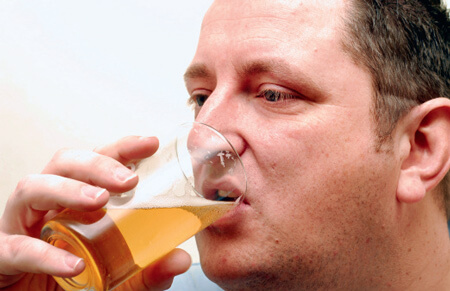Misbehavioural economics
The Prime Minister is a known devotee of behavioural economics theory, especially the ideas propounded by Professor Richard Thaler, author of Nudge: Improving Decisions about Health, Wealth and Happiness.
The political attraction of ‘nudging’ is that it focuses on encouragement, rather than coercion, to achieve socially desirable change.
Confronted with the reality of our urban streets on a booze-fuelled Saturday night, however, David Cameron has opted for something tougher. In an announcement last week he outlined plans to enforce a minimum retail price of 40p per standard unit of alcohol. So a can of cheap, strong lager containing three units would increase from 75p to £1.20. Multi-buy deals would be banned.
This is a punishment, not a nudge, and it will affect the guiltless as well as the legless. Cameron has become the teacher who makes the entire class stay behind after school, in the hope that the perpetrator of some misdemeanour will confess. The danger is that the government will alienate a majority of tipplers, and set up a confrontation with the drinks industry for good measure.
Worse, it may not work – for no sooner does the PM abandon one branch of behavioural theory than he runs into the implications of another: ‘hedonic consumption’.
This body of research has been developed over about 30 years, principally by the academics Hirschman, Holbrook and Featherstone. One of its central observations is that the pleasures of excess don’t always happen in a spontaneous rush, but are frequently planned carefully in advance.
A 2007 study led by Bath University explored the theory in the context of alcohol by interviewing young people who frequently binge-drink. The report is peppered with oxymorons that offer a fascinating insight into the complexity of hedonistic behaviour: ‘controlled loss of control’, ‘disciplined drunkenness’, ‘calculated intoxication’.
What is striking is the calm consideration of where, what, and how much to drink – whether it will be a ‘chilled evening out’ or whether the entire point is to ‘get mullered’. Planned inebriation is not the same as random drinking, and there are consequences that follow from that.
When people plan, they make considered choices based on the information available to them. New information is that alcohol will be more costly. Although it is conceivable that this could result in the decision to drink less, experience from related sectors, such as drugs, suggests that more probable is the development of strategies to get round the issue.
This is where the Prime Minister’s gamble may run into unintended consequences: a switch to cheaper highs, more black-market booze, even exporting the problem with a Friday-night flight to the low-cost bars of Belgium or France.
Simplest of all might be increased determination to make drunkenness the result of what will now be a more expensive night out. As one study respondent put it: ‘If you don’t get pissed, it’s a waste of money.’
Cameron is right to try to do something about the problem. Rather than take a punitive swipe at those who don’t binge, though, he would be better advised to gain an empirical understanding of those who do. The theory may not be pretty, but it is there.
We call it emotional reward, academics call it ‘hedonic response’ – either way it’s about the multisensory, fantasy and emotive areas of consumption.
When engaging in hedonic consumption, research shows that people aim for a specific pattern of emotional arousal. It’s one that most of us will be familiar with: low-level arousal increasing in intensity to climax and then gradually subsiding. It’s no accident that this pattern is reflected in most successful movies, novels, plays and roller-coaster rides.
An international study of six cultural groups (Chinese, English, Greek, Irish, Italian and Jewish) found hedonic motivation toward certain consumption activities ‘differed greatly’ by ethnic group.

Emotional hedonic consumption
More recent consumer research has focused on the hedonic trade-off – how, when and why consumers might trade functional superiority for a more hedonic experience, and vice versa.
Behavioural economist Daniel Kahneman quotes the idea of a ‘hedonimeter’ – an imaginary instrument first mooted by the 19th-century economist Francis Edgeworth, which would measure the pleasure or pain an individual experiences at any moment.
